Uncommon lifestyles and the truth about the 4-Hour Workweek: An interview with Tim Ferriss
One of the fundamental premises of the Get Rich Slowly philosophy is that by making sacrifices and smart moves now, you can create a better life in the future. 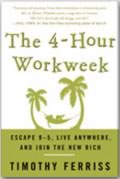 It's a philosophy of deferred gratification.
It's a philosophy of deferred gratification.
But what if you don't want to wait to enjoy life's rewards? What if you want to take advantage of opportunities while you're still young? Is there a way to do this while still maintaining a smart approach to money?
Timothy Ferriss says there is.
The Total Money Makeover review: Dave Ramsey’s best book?
 According to Get Rich Slowly founder J.D. Roth, Dave Ramsey and his influential book "The Total Money Makeover" changed his life:
According to Get Rich Slowly founder J.D. Roth, Dave Ramsey and his influential book "The Total Money Makeover" changed his life:
"In the fall of 2004, I had over $35,000 in consumer debt. I was making a solid middle-class salary, but I lived paycheck to paycheck. My money habits were terrible. When I looked into the future, all I saw were years of toil to pay for the things I'd already purchased.
"Then a friend loaned me a copy of The Total Money Makeover, a book by some guy I'd never heard of named Dave Ramsey.
The Kitchen-Table Investor: Wealth-Building Strategies for Working Families
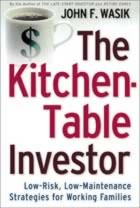 As you might expect, most of my personal investments are safely tucked away in index funds, those mutual funds designed to track the performance of a particular stock market index. This is a smart way for the average investor to achieve solid growth over the long-term.
As you might expect, most of my personal investments are safely tucked away in index funds, those mutual funds designed to track the performance of a particular stock market index. This is a smart way for the average investor to achieve solid growth over the long-term.
However, I continue to hold about 5% of my investment capital in reserve as "mad money". While the rest of my investments are conservative, I use this money to purchase whatever investment strikes my fancy.
I don't do a good job.
Growing Money: A Complete Investing Guide for Kids
During my family's Christmas celebration, I learned a little more about my oldest nephews. I don't see them often, so it's hard to know what interests them. This year, I learned that six-year-old Alex likes art. You can bet I'll be encouraging this productive hobby — the only other two things I know he likes are dinosaurs and video games. I was also pleased to learn that his older brother, Michael, likes money.
"I have $86 saved," Michael told me. "It's for my trip to Florida." The two boys were taking a trip over Christmas break to visit their grandmother.
"That's great," I said. Continue reading...
The Ultimate Cheapskate’s Guide to True Riches
Jeff Yeager calls himself the Ultimate Cheapskate. He's serious about saving money. He's the sort of guy who soft-boils his morning eggs by putting them in the dishwasher while it runs. In a package he sent me recently, he included his business card, which is simply a rubber stamp printed on a piece of a brown paper bag. His wife calls him the cheapest man in America, and he's proud of it.
The road map to true riches
Yeager has a new book called The Ultimate Cheapskate's Road Map to True Riches, in which he preaches the virtues of frugality and the dangers of mass consumption.  Before the first chapter, he offers a statement of purpose:
Before the first chapter, he offers a statement of purpose:
Living on less is a good thing to do. It's the only financial advice that will work for almost everyone. It's about a quality of life that you cannot buy, a sense of satisfaction you cannot fake, and an appreciation for others that gives life value. It's also about helping save the planet and sharing with those in need. Living on less can be funny, but it's no joke.
The Random Walk Guide to Investing: Ten rules for financial success
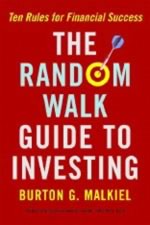 In 1973, Burton Malkiel published A Random Walk Down Wall Street, in which he argued that a blindfolded monkey could pick stocks as well as a professional investor. Though I bought a copy of Random Walk for $3.99 at the local Goodwill last year, I haven't read it. It looks dense. I know it's written for the layman, but it still seems rather academic.
In 1973, Burton Malkiel published A Random Walk Down Wall Street, in which he argued that a blindfolded monkey could pick stocks as well as a professional investor. Though I bought a copy of Random Walk for $3.99 at the local Goodwill last year, I haven't read it. It looks dense. I know it's written for the layman, but it still seems rather academic.
In 2003, Malkiel published The Random Walk Guide to Investing, "a book of less than 200 pages in length that boils down the time-tested advice from Random Walk into an investment guide that [is] completely accessible for a reader who knows nothing about the securities markets and who hates numbers."
Several patient GRS-readers have been recommending this book for the past year. When I stayed home sick yesterday, I finally found time to read it. I'm impressed. Malkiel has produced an easy-to-read straightforward investment guide that I'm happy to recommend to anyone. His philosophy matches my own:
All Your Worth: The Ultimate Lifetime Money Plan Book Review
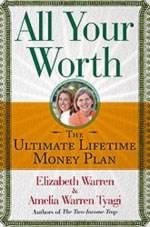 Three years ago, I decided to get out of debt. I hit the books, reading one personal finance title after another, searching for answers. Two books — Your Money or Your Life and The Total Money Makeover — were perfect for my situation. They gave me the tools I needed to tackle my problems. Now I've found a third book that would have been useful at the start of my journey to financial freedom.
Three years ago, I decided to get out of debt. I hit the books, reading one personal finance title after another, searching for answers. Two books — Your Money or Your Life and The Total Money Makeover — were perfect for my situation. They gave me the tools I needed to tackle my problems. Now I've found a third book that would have been useful at the start of my journey to financial freedom.
All Your Worth: The Ultimate Lifetime Money Plan, published in 2005, was written by the mother-daughter team of Elizabeth Warren and Amelia Warren Tyagi. These women don't get bogged down in the details of frugality and investing. They're more interested in changing behavior, in fixing the big stuff. They offer a framework around which the reader can build lasting financial success.
A Balanced Budget
Though Warren and Tyagi would have you believe that their system is different from anything that's ever been published, it's not. It puts a different spin on things sometimes, but ultimately their advice is similar to that found in most other solid personal finance books. All Your Worth is about creating a budget.
The Incredible Secret Money Machine
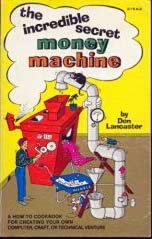 In 1978, Don Lancaster — a computer and electronics geek — published a book called The Incredible Secret Money Machine. Though the title smacks of get-rich-quick schemes, The Incredible Secret Money Machine is really about starting and running a small business.
In 1978, Don Lancaster — a computer and electronics geek — published a book called The Incredible Secret Money Machine. Though the title smacks of get-rich-quick schemes, The Incredible Secret Money Machine is really about starting and running a small business.
To Lancaster, a "money machine" is any venture that generates "nickels". Nickels are small streams of revenue from individual customers. If your goal is simply to earn a comfortable income for yourself by doing something you love, then this book can help you explore the idea of business ownership. It's not going to help you launch the next Google or Microsoft, though. Lancaster is all about nickels, not about dollars.
Getting Started
Lancaster says that in order to build a money machine, you must adhere to four basic beliefs. (Note that I've left his very-1970s language as-is.)
Book review: The Automatic Millionaire

David Bach is perhaps best known for coining the term the latte factor, a phrase that has almost become a joke in personal finance circles. That's too bad, really, because Bach has some good ideas. And the latte factor is a marvelous concept, applicable to many people who casually spend their future a few dollars at a time. Bach's most popular book is The Automatic Millionaire. I've referred to it often, but never reviewed it until today.
The Automatic Millionaire is based on sound financial concepts. The author encourages readers to eliminate debt, to live frugally, and to pay themselves first. But the core of his book is unique: rather than develop will power and self-discipline, Bach says, why not bypass the human element altogether? Why not make your path to wealth automatic?
Book Review: Voluntary Simplicity
 For years, one of my goals has been to achieve a "pastoral lifestyle". This amuses my friends, but it's true. By "pastoral lifestyle" I mean that I want to create for myself a life that flows at a slower pace, a life removed from the concerns of the day-to-day world. What I hope to achieve is often called "voluntary simplicity", and there's a whole movement devoted to the concept.
For years, one of my goals has been to achieve a "pastoral lifestyle". This amuses my friends, but it's true. By "pastoral lifestyle" I mean that I want to create for myself a life that flows at a slower pace, a life removed from the concerns of the day-to-day world. What I hope to achieve is often called "voluntary simplicity", and there's a whole movement devoted to the concept.
Duane Elgin's Voluntary Simplicity is a cornerstone book to this movement, and I expected great things from it. I was sorely disappointed. Elgin begins with a nice explanation of voluntary simplicity:
We each know where our lives are unnecessarily complicated. We are all painfully aware of the clutter and pretense that weigh upon us and make our passage through the world more cumbersome and awkward. To live more simply is to unburden ourselves — to live more lightly, cleanly, aerodynamically. [...] The objective is not dogmatically to live with less, but is a more demanding intention of living with a balance in order to find a life of greater purpose, fulfillment, and satisfaction. Continue reading...
More about...Books